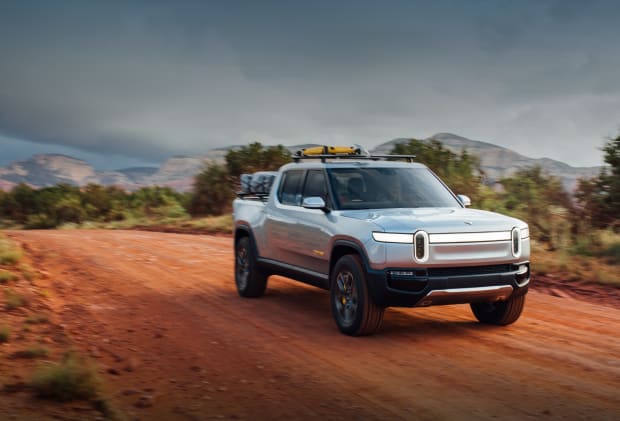
It's an announcement that is somewhat like a thunderbolt in the automotive industry.
Three months ago, Rivian, which aims to challenge Tesla in the race for electric vehicles, announced with fanfare a partnership with Mercedes-Benz (DMLRY) to manufacture electric vans in Europe.
For Rivian (RIVN), it was a key partnership as the company encountered difficulties in increasing its production capacities. Rivian is burning a lot of cash and is facing rising costs due in particular to soaring prices for raw materials and other logistics costs.
The prices of nickel, cobalt and other raw materials used in electric vehicles have jumped since the beginning of the war between Russia and Ukraine in February. Both countries are key suppliers of strategic metals. All this has substantially increased the costs for car manufacturers. The cost of battery development has more than doubled since the coronavirus pandemic, AlixPartners has calculated.
'Pause'
The costs of raw materials (cobalt, nickel, lithium) for an individual EV have on average increased by almost 144% in two years to $8,255 as of last May, according to the research firm. As of March 2020, these costs amounted to $3,381.
The overall cost of developing the average electric vehicle has increased by about $2,000 over the past two years, the research firm added.
"We are sharing investments and technology [with Rivian] because we also share the same strategic ambition: accelerating the electrification of the van market with sustainable and superior products for our customers," Mathias Geisen, head of Mercedes-Benz Vans, said when the partnership was announced on September 9.
The two companies had planned to produce two large vans, one based on Mercedes engineering and the other based on the second-generation electric van at Rivian, the Light Van.
But three months later, all these plans have fallen through with the two companies announcing that they are ending this partnership. Rivian said in a press release on December 12 that it is pausing plans to produce its electric commercial vans in Europe and will therefore no longer pursue the memorandum of understanding with Mercedes-Benz.
"We’ve decided to pause discussions with Mercedes-Benz Vans regarding the memorandum of understanding we signed earlier this year for joint production of electric vans in Europe," said Chief executive Officer RJ Scaringe. "As we evaluate growth opportunities, we pursue the best risk-adjusted returns on our capital investments."
"At this point in time, we believe focusing on our consumer business, as well as our existing commercial business, represent the most attractive near-term opportunities to maximize value for Rivian. We share the same goal as Mercedes-Benz vans, to help the world transition to electric vehicles, and we look forward to exploring opportunities with them at a more appropriate time for Rivian.”

Rivian
This retreat is surprising because the partnership would have enabled the group to enter a new market at lower cost and accelerate its expansion. In the short term, this complicates Rivian's ambitions to compete with Tesla, which is present in three important markets - North America, China and Europe.
Stock Is Down 74%
As a result, Rivian's stock fell by more than 5% in pre-market electronic trading on Wall Street. Rivian stock prices have lost almost 74% this year. During the third quarter, the firm widened its losses, recording a net loss of $1.72 billion, against $1.23 billion in the third quarter of 2021.
"Throughout the quarter, our cost of materials was impacted by inflationary pressures, which we believe will continue to have an impact on our gross margin for the near future," the company explained at the time.
The the Irvine, Calif., company is at a pivotal point in its history, the stage of mass production. This one is very difficult. Rivian shocked investors by announcing several months ago that it would not achieve its 2022 production target. The company would only produce half of the vehicles it intended to manufacture this year.
Rivian, which currently produces the R1S SUV, R1T pickup/truck and EDV commercial van, is also trying to reduce costs by cutting jobs.
Some investors are beginning to lose patience, like billionaire George Soros, who further reduced his stake in the third quarter. Soros Fund Management held 16.36 million Rivian shares as of September 30, down 8.2% compared to the second quarter.
"Our collaboration with the Rivian team has been based on a common engineering passion and a strong spirit of partnership.” Mercedes-Benz' Geisen said in a statement on December 12. "That’s why I respect and understand the decision of Rivian to prioritize the delivery of their consumer business and existing commercial business in the near-term."
"While the timeline for our common European production joint venture is now on hold, the pace of our own electrification strategy at Mercedes-Benz Vans remains unchanged."
This is not the first time that Rivian has ended an agreement to produce vehicles in cooperation with a legacy carmaker. The group had abandoned a project to produce an electric vehicle with Ford (F)in November 2021. The Blue Oval was one of Rivian's first shareholders but has since significantly reduced its stake.







